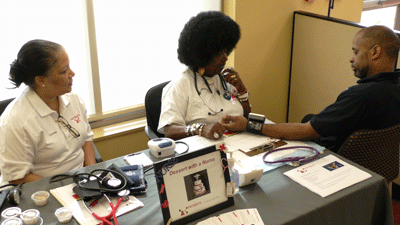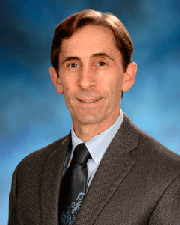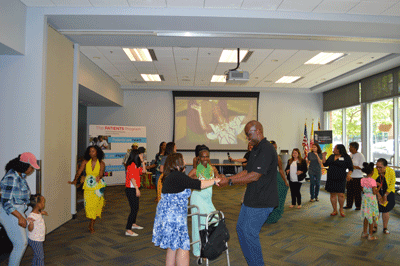The office window of C. Daniel Mullins, PhD, Professor and Chair of the Department of Pharmaceutical Health Services Research (PHSR) at the University of Maryland School of Pharmacy, provides a picturesque view to the West Baltimore community he champions for, speaks highly of, and speaks about so passionately. And on this beautiful summer day, the view from his office, located in The Saratoga Building on 220 N. Arch Street, provided the perfect backdrop to the vision he was about to share.
“My vision is that we would have such an impact on West Baltimore, that it would be a model to the nation,” said Dr. Mullins. “Through research, we want to make West Baltimore one of the healthiest, vibrant communities in the nation.”
C. Daniel Mullins, PhD, Professor and Chair of the Department of Pharmaceutical Health Services Research (PHSR) at the University of Maryland School of Pharmacy, is Executive Director of The PATIENTS Program.
He added, “We want residents to know they can put aside the distrust based on history and began to actively participate in transforming health in our city. We want people to know that you can transform a community that has low health measures, and have them be above average. Every jurisdiction would say if it can happen in West Baltimore, it can happen in their community.”
A bold vision. But one that is not impossible thanks to The PATIENTS Program. Housed in the University of Maryland School of Pharmacy, The PATIENTS Program leverages innovative partnerships with patient communities and health care systems to ensure that patients, health care providers, and other partners are actively engaged in research.
Dr. Mullins is Executive Director for the program.
“One thing I have observed is that you have to listen to what the community and community partners have to say,” said Dr. Mullins. “This ultimately helps the way research is done. Working together, we are developing solutions to deal with the challenges people face. This program offers a community-driven lens that fills the research gap.”
Rodney Elliott, an Engagement Specialist with The PATIENTS Program and PATIENTS advisor Debra Marvel (center front), participate with the Het Heru Healers in a line dance during PATIENTS Day 2K19.
The PATIENTS Program trains patients, stakeholders, and researchers to become co-developers of Patient-Centered Outcomes Research (PCOR). The innovative program is funded through a five-year infrastructure development grant from the Agency for Healthcare Research and Quality (AHRQ).
“We have started thirty-five new projects we support,” said Dr. Mullins. “Some are very small and may be five or ten thousand-dollar projects led by the community, and some are twelve million-dollar clinical trials. What they have in common is that we work with people with experience in the community, and researchers, with the goal of having patients make more informed decisions around healthcare.”
He continued, “The program has done great. The initial five million dollars for the program came from AHRQ. We have generated over 40 million dollars. The important part is that we require any researcher we work with to support our community partners. Money should be given to the community to compensate them for their time the same way our staff and faculty are compensated.”
The program’s partners include the University of Maryland Medical Center (UMMC); PatientsLikeMe; Mt. Lebanon Baptist Church; the Association of Black Cardiologists (ABC), and Bon Secours Baltimore Health System. More than 60 University of Maryland researchers also support The PATIENTS program.
Dr. Mullins has been with University of Maryland School of Pharmacy for 25 years. His research and teaching focus on community-engaged, patient-centered comparative effectiveness research to advance health equity. In addition to AHRQ, he has also received funding from the National Institute on Aging (NIA), the Patient-Centered Outcomes Research Institute (PCORI), and various pharmaceutical manufacturers including Bayer, Merck, and Pfizer.
“We think about the clinical aspect and social determinants,” said Dr. Mullins. “These are factors that makes it harder for people to be healthy, such as food deserts – healthy foods not in walking distance; and food swamps, abundant access to foods that are not healthy. The reason why we see childhood obesity is because children have abundant access to foods that are not healthy.”
He added, “We don’t want to scare people. However, we want to ensure they are informed by having the information they need, so that they can make healthy choices for themselves. We want people not only to remain on this planet, but to remain on this planet in a healthy state of being. That means low rates of heart attack, early diagnoses of cancer, the ability to solve health problems when patients come to the hospital, so they are not readmitted, and educating people as to why prevention is so much wiser than waiting to get sick and then seeking treatment. The PATIENTS Program provides a way to make all of those things possible.”
For more information about The PATIENTS PROGRAM, visit https://patients.umaryland.edu/


